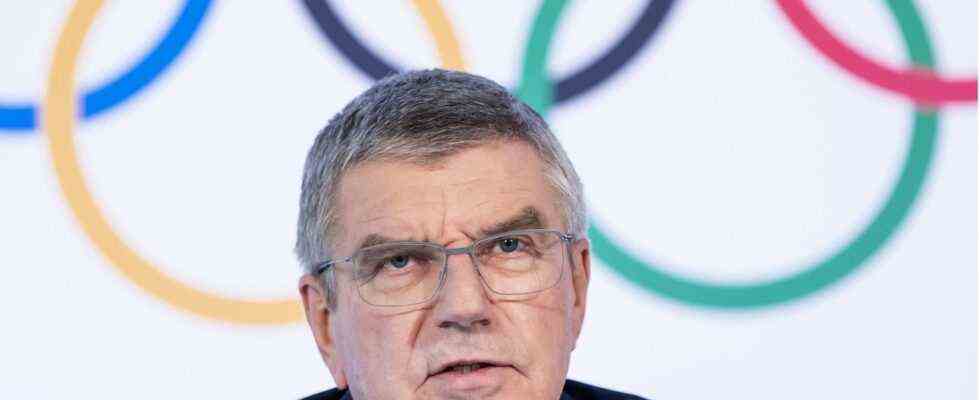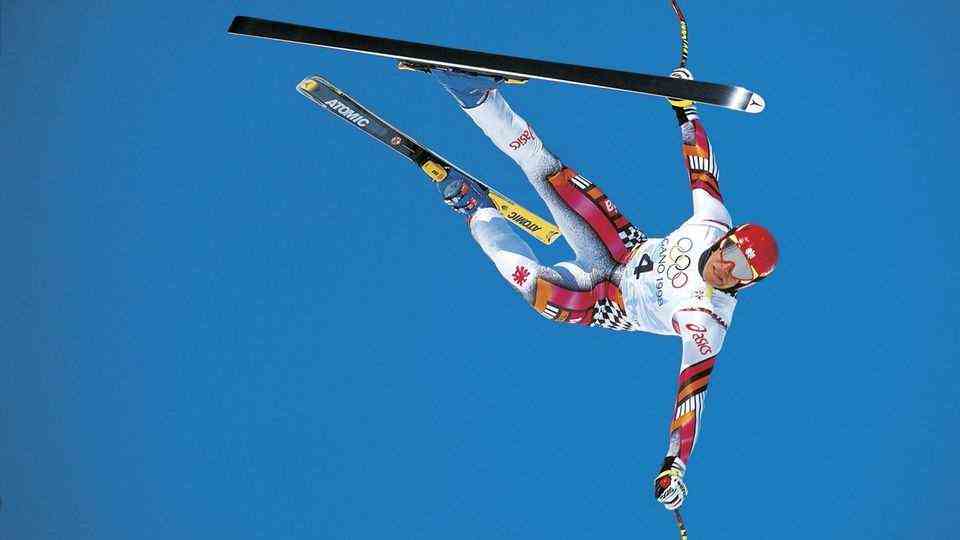winter Olympics
Nazi images, Uyghurs and the Peng Shuai case: the IOC’s ignorance harms sport
Thomas Bach and the International Olympic Committee are criticized for dealing with China before the Winter Games in Beijing.
© Jean-Christophe Bott / DPA
Any criticism of its dealings with China rebounded from the International Olympic Committee, and officials doubt that there are human rights violations. At the same time, you use old Nazi propaganda on your own social media channels. It cannot and must not go on like this.
“Citius, Altius, Fortius” – the motto “Faster, Higher, Stronger” shown in the Olympic Charter stands for the demands placed on the athletes in the competitions that take place every four years. But it could also symbolize the dropouts of the IOC officials, who regularly outdo each other when making politically sensitive statements, stepping increasingly quickly and coming under increasing pressure just two months before the Olympic Winter Games in Beijing. A small selection of the failures of the International Olympic Committee (IOC) in the last few days:
The Peng Shuai case – everything is fine for the IOC
There is the case of the Chinese tennis player Peng Shuai, who throws a gloomy light on the IOC. In early November, the 35-year-old accused First Deputy Prime Minister Zhang Gaoli of sexually abusing her in 2018 on the Weibo social media platform. Only shortly after it was published, the post disappeared, as did Peng Shuai himself. All attempts at contact by the international women’s tennis association WTA and other organizations have since come to nothing. This is followed by the appearance of the IOC after the pressure on the organization because of the upcoming Beijing Games increased: In mid-November, the press department published a photo of IOC boss Thomas Bach, which is supposed to show him in a video conference with Peng Shuai. The IOC did not provide any specific information about the content of the conversation, instead relying on “silent diplomacy that will be pursued further,” said Bach in an interview with the German press agency.
After the interview, the IOC assured that Peng Shuai is fine and that privacy is important to her. Little is known about the circumstances of the talks – Peng and Bach spoke again at the beginning of December – so that the impression arises that the IOC is allowing itself to be harnessed by China and that holding the Winter Games is the primary goal. An accusation that the Athletes Germany Association made to the IOC in a public letter last week. “The questionable handling of Peng Shuai has renewed our doubts about the motives of the IOC,” the letter said. The attitude of the umbrella organization leads to fear that the IOC will attach greater importance to “political and economic interests” than to the protection of athletes. The WTA showed that you can simply act instead of Wischi-Waschi statements. The association declared that they would no longer host any tournaments in China and that they would accept considerable financial losses. According to “Sports Illustrated”, the WTA generates around a third of its income on the Chinese market.
Abuse of Uyghurs in China? The IOC has not heard of this yet
As opaque as the Peng Shuai case is, the IOC’s position on China is becoming clearer. After the Peng Shuai files had closed a little in the last few days, IOC official Richard Pound caused a sensation with questionable statements in an interview with Deutschlandfunk. When asked about the situation of the Uyghurs, a Muslim minority living in Xianjing, hundreds of thousands of whom are being interned in re-education camps, Pound said he knew “too little about the facts”. At the same time, however, Pound sowed doubts about the allegations against China. “What is claimed to be a fact doesn’t have to be true,” said Pound. Pound also doubted that there were reports from human rights organizations (“Are there any? Really?”) And also said that Buzzfeed and the New York Times did not know anything about the situation in Xianjing: “You can blame me for my ignorance insult as you like. But I don’t know. “
The fact that Pound ends the interview with the athletes being allowed to express their opinions freely in consultation with China, just not in competitions and the award of medals is the cherry on the cake. Because what the IOC is celebrating here as a great achievement in exchange with China is nothing more than a rule in the Olympic Charter. Breaking your own rules would be just as fatal to the reputation of the IOC as an athlete jailed for his opinion in China. And mind you: Pound is also confusing the rules of the charter. In the interview, the 79-year-old refers to rule 30 of the Charter on freedom of expression. However, this deals with the country designation of the respective national Olympic committees. Rule 50 would have been correct, which as an IOC member since 1978 could well have known.
Pound’s attitude and that of the IOC are as simple as it is obvious. With anything that could put the IOC in an unfavorable light, you duck down and give the unsuspecting. What you don’t know doesn’t make you hot. And if you have never heard of human rights violations in China, everything is fine with the dreamlike hosting of the Winter Games. In the long run, it would be advisable for the IOC’s reputation to award competitions in countries in which massive human rights violations are not documented – the same applies to Fifa and the World Cup in Qatar.
Nazi propaganda on social media? What’s included!
But the IOC wouldn’t be the IOC if it didn’t dig a pit for itself. The internet rarely forgets and so it doesn’t forget the next messed up social media presence of the IOC. In preparation for the upcoming winter games, posters from previous games were shown on the channels. It all started with the 1928 Winter Games in Sankt Moritz, with an Alpine backdrop and the flags of the IOC and Switzerland. The 1932 Winter Games in Lake Placid with a shaded ski jumper and the US map could also be seen there. However, with the post about the 1936 Nazi Winter Games in Garmisch-Partenkirchen, the social media department triggered the next legitimate shit storm at the weekend. “Do you like it?” The IOC asks the user and immediately acts as an art critic. The poster is characterized by the color contrasts and the asymmetrical lines. That the poster comes from Ludwig Hohlwein – the man who helped shape the visual appearance of the Third Reich – and shows an athlete giving a Hitler salute? Incidental! The historical and political context of the Nazi propaganda games is completely obsolete here, after all, it was 85 years and a world war ago.
Last year, the IOC posted a video of the 1936 Summer Games in Berlin on Twitter and a reference to the first torch relay that brought the fire to its shell. Images from Leni Riefenstahl’s propaganda film “Olympia” were used for this. There was no classification here either. A new image clip was released in July of this year. In this, the IOC advertises with Ágnes Keleti, the oldest surviving Olympic champion and Holocaust survivor. The story is cut again with pictures of the Nazi games by Leni Riefenstahl. This “breaking the boundaries of the taboo”, titled by the “FAZ”, is all the more tasteless, since Keleti’s father and several uncles were murdered by the Nazis in Auschwitz.
After strong criticism on social media, the post was deleted by the IOC over the weekend without comment. The poster with a similar title can still be found on the homepage – Here, too, there is no trace of a historical or political classification. It is a devastating picture that the IOC as a whole is casting off. The committee continues to attach importance to separating sport and politics from one another. Many political issues have long since arrived in sport, be it the kneeling of athletes before the start of the game as a sign against racism, the commitment of many clubs against homophobia or the disappearance of athletes after criticizing the politics of their home country. But as it is, the organization turns itself into a plaything for dictators, autocrats and other despots. The arrogance and ignorance of IOC leaders in dealing with important political and humanitarian issues harm sport in general.
Without a doubt, the Olympic Games, like all other major sporting events, have degenerated into an instrument worth billions, but putting finances and one’s own reputation before the welfare of athletes worldwide is exactly the wrong path that the IOC (and also Fifa) is taking . The upcoming games in Beijing could be titled “cost what it may” – even if it is the lives of umpteen innocent people. Perhaps it is also worthwhile if the IOC adopts a new motto: “Hear nothing, see nothing, say nothing” now seems to be more appropriate.
Sources: Twitter, The mirror, Deutschlandfunk, FAZ


